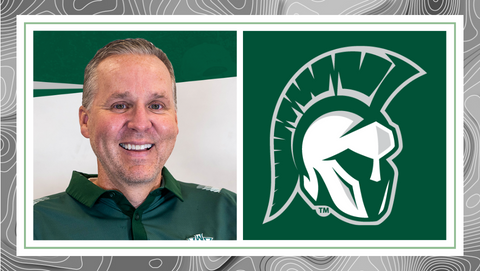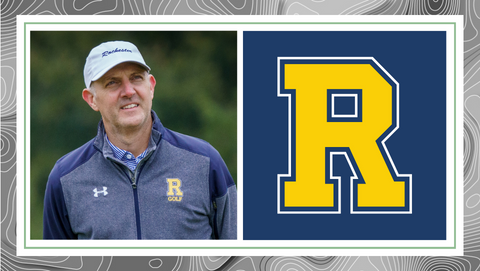Mentioned in this post

Jim Ott | Illinois Wesleyan

Dan Wesley | Rochester
It probably seems like you’ve spent your entire academic life adding achievements and activities to your academic resume in preparation for college. If your goal beyond high school, though, is to make it onto a college golf team roster, you should be building a unique kind of resume targeted at impressing the right College Coaches.
Ensuring that your college golf resume hits all the proper notes and is presented in a way that stands out to coaches involves a delicate combination of art and science. Therefore, we asked the experts, some of the top college golf coaches in the country, what an ideal golf resume should contain so it rises above the sea of emails coaches regularly receive.
“I love to hear from kids who are competing and moving up to higher and higher-level tournaments so they’re pushing themselves to play against better players,” said Jim Ott, Men’s Head Golf Coach at Illinois Wesleyan. “Academics are important, too, because that shows you about the kid’s discipline, organization, and responsibility. That tells you a little bit about their personality and shows how conscientious, organized, and responsible they are. You know if they’re bringing the full package together.”
The most common advice we heard from coaches was to keep your golf resume simple and concise but thorough with the right data. For example, a solid tournament resume will include scores, the par, yardage, and course rating of the golf course where each tournament was played, the size of the field, and where you placed. Hey, if you keep data on the fairways and greens that you hit in regulation and your strokes gained numbers, that’s great. But just give the coach a synopsis or average, not a round-by-round deep dive. They should be duly impressed that you’re tracking your results and trying to improve.
Coaches encourage aspiring college golfers to include EVERY score, even the highest rounds.
“I want to see how young players handle adversity, so knowing how they handle a round when things aren’t going their way tells me a lot about that player’s maturity on the course and maybe even if they have leadership potential,” said Dan Wesley, Men’s Head Golf Coach at the University of Rochester.
Coaches want to see the caliber of tournaments you’re playing and the kind of competition you’re competing against, so include accurate, searchable details on the tournaments and the organizations hosting them. You might get the chance to play in front of college coaches, so it’s good to know what they’re looking for beyond how you swing and what you score.
“I want to see how a player accepts good and bad shots, and I want to see how they interact with other players, rules officials, and the people running the golf tournament. The ideal candidate for our roster is a good person who is also a good player,” Wesley adds.
For all of the coaches who won’t get to see you playing in person, consider adding videos to your college golf resume. You can speak directly to the camera to give coaches a taste of your personality and your goals, and brief golf swing videos or shot highlights can also be a big asset to your resume.
“We definitely tend to click on the videos, so more and more, that’s a vital part of how outreach from a potential player stands out to a coach. If they want to include a link to their golf-specific social media page, that’s informative, too,” Wesley says. “And, bear in mind, we’re looking at the golf content but we’re also looking at how you portray yourself online in what attributes of your personality and character you’re choosing to show.”
One coach says he pays attention to who the player uses as a swing coach because “if the teacher has a proven track record of helping players reach the next level, the family has done their homework and committed to a working plan to play better and progress as a competitor.”
Coaches also stress that the first part of being a student-athlete is the “student” component, so provide an up-to-date academic transcript and a concise description of what you intend to study in college. Many coaches prefer to see this information prominently displayed in the résumé so they know immediately that the candidate meets the academic requirements at their institution.
Along with your tournament record, coaches will be impressed to see that you attend coaches’ camps like CGX Top25, Preview, or Prospect Camps because it shows the willingness to learn more about the pathway to college golf and an eagerness to spend quality time with college golf coaches. Including this information on your résumé will indicate to coaches that you’re going the extra mile to prepare for thriving in the right fit on a college golf roster.
To find a camp near you, visit our upcoming schedule.
“Learning from college coaches, being able to ask them anything you ever wanted to know and seeing how a college golf practice works is incredibly valuable,” said Ott. “Then, going on the course with coaches and seeing how the practice applies to playing and scoring is huge. Between the on-course learning and the deep-dive Q&A sessions, players leave with a ton more confidence than they had when they arrived. The benefits from attending these camps can be an absolute game-changer for families.”
Other advice coaches give on building a college golf resume that will resonate with the right coach includes being careful to proofread and be sure you’re addressing the correct coach by name. If you’re sending several coaches the same basic message all at once, be sure to personalize and properly address each coach. Proper grammar, punctuation, and clarity of thought might not register as highly as hitting towering drives and being able to maneuver iron shots both ways, but good communication does show that you are academically prepared for the next level.
Coaches encourage young players to reach out when they have something significant to share with them. Don’t be shy. But, get to the point quickly and don’t undervalue the opportunities to go one-on-one with several top coaches at a CGX camp. It’s the perfect environment to ask any question you want answered by the ultimate experts. It’s also going to give you a clear impression of the kind of coaches and schools that are the best fit for your game, your personality, and goals. The education and networking opportunities you get from a camp will carry you a long way toward your dream of playing college golf and help put you on the college golf radar.
“Coaches definitely talk to other coaches, and we go into CGX camps with notes on certain players that we add to those notes throughout the camp and beyond. I might have already completed my recruiting cycle, but I’m always talking to other coaches about players, and the more we know about a player, the more we are in a position to suggest a fit that could be amazing for them.”
You can learn more about college golf resumes and the recruiting process at an upcoming CGX camp. We want to hear from you and any questions you might have about setting yourself up for ultimate success on the next level. Email us anytime!
